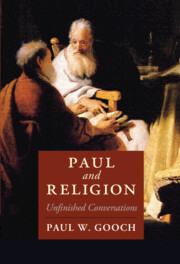Book contents
- Paul and Religion
- Cambridge Studies in Religion, Philosophy, and Society
- Paul and Religion
- Copyright page
- Dedication
- Contents
- Preface
- 1 What Does Paul Have to Do with Religion?
- 2 What Kind of Religious Interlocutor Is Paul?
- 3 What Is the Religious Form of Life for Paul?
- 4 What Does the Pauline Religious Form of Life Have to Do with Death?
- 5 What, for Paul, Is the Nature of the Religious Form of Community?
- 6 How, for Paul, Should Life ‘in Christ’ Be Lived?
- 7 What, for Paul, Are the Marks of Membership?
- 8 How, for Paul, Does a Religious Community Relate to Others?
- 9 Paul and Religion
- Select Bibliography
- Locorum Index
- Subject Index
6 - How, for Paul, Should Life ‘in Christ’ Be Lived?
Love and Do What You Will
Published online by Cambridge University Press: 31 March 2022
- Paul and Religion
- Cambridge Studies in Religion, Philosophy, and Society
- Paul and Religion
- Copyright page
- Dedication
- Contents
- Preface
- 1 What Does Paul Have to Do with Religion?
- 2 What Kind of Religious Interlocutor Is Paul?
- 3 What Is the Religious Form of Life for Paul?
- 4 What Does the Pauline Religious Form of Life Have to Do with Death?
- 5 What, for Paul, Is the Nature of the Religious Form of Community?
- 6 How, for Paul, Should Life ‘in Christ’ Be Lived?
- 7 What, for Paul, Are the Marks of Membership?
- 8 How, for Paul, Does a Religious Community Relate to Others?
- 9 Paul and Religion
- Select Bibliography
- Locorum Index
- Subject Index
Summary
The question of how we should live is a perennial concern. Immanuel Kant asked ‘What ought I to do?’ as the second of three questions crucial to humanity. This what-to-do question belongs, he says, to ethics. The first question, ‘What can I know?’, Kant gives to metaphysics, and the third, ‘What may I hope?’, to religion. However, when it comes to helping people resolve their questions about how to live, religions are only too happy to spend more time on ethics than on hope. Indeed, among the functions religions carry out assiduously is telling their adherents how they should behave. Moreover, religious edicts range wider than ethics: they encompass religious practices, social relations, and civic duties. The answers to ‘what must I do religiously?’ set out the qualities of a virtuous life, but they are also intended to create and express distinctive identity, to reinforce what our group does as opposed to other groups.
- Type
- Chapter
- Information
- Paul and ReligionUnfinished Conversations, pp. 107 - 125Publisher: Cambridge University PressPrint publication year: 2022

